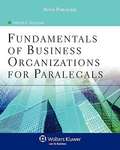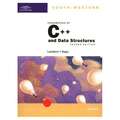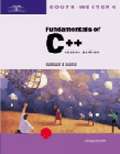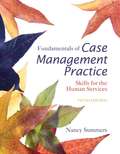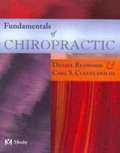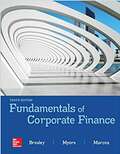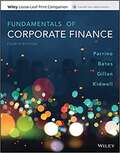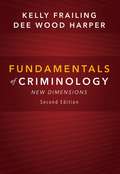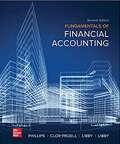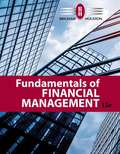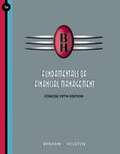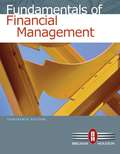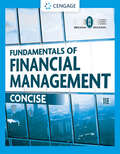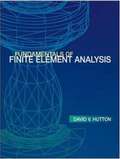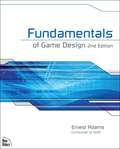- Table View
- List View
Fundamentals of Business Organizations for Paralegals (3rd Edition)
by Deborah E. BouchouxFundamentals of Business Organizations for Paralegals, Third Edition, offers a concise treatment of all of the forms of business organizations in the United States. The author provides thorough, succinct treatment of all pertinent topics, making this book the ideal choice for instructors who teach a shorter course and need a text that covers critical topics with a more straightforward approach. Attentive To The fundamentals paralegal students need to know, this concise paperback provides: a basic and thorough understanding of all the various types of business organizations in a direct and concise format a discussion of each form of business organization, including the nature of the entity, advantages and disadvantages, formation of the entity, operation and management, transferability of ownership, dissolution, and tax consequences more in-depth treatment of Limited Liability Partnerships and Limited Liability Companies than other texts useful exhibits and charts that highlight important topics and sample forms that are integrated with the textual discussion throughout the book Internet resources in each chapter that direct readers to Internet sites that may provide additional information, forms, or agreements Key Terms defined in the margins for easy reference, practice tips in each chapter that provide pragmatic information for paralegals, lists of relevant websites and of tasks commonly performed by paralegals, and a complete glossary that provides an easy reference for terminology Case Illustrations -- brief summaries of cases that illustrate one of the concepts or topics addressed in the chapter Discussion Questions in each chapter that stimulate class discussion and ensure that students Understand The material a complete ancillary package, including an instructor's manual with a test bank and PowerPoint slides. The Instructor's Manual will also provide additional forms, such as tax forms, not included in the text New to Third Edition: each chapter includes all new discussion questions, Internet questions, and Case Illustrations Chapter 6 discusses Revised Uniform Limited Liability Company Act Chapter 10 discusses new trends in corporate governance, such as the move toward electing boards of directors by majority rather than plurality vote, The move toward eliminating staggered or classified boards of directors, new SEC rules and regulations, And The availability of proxy materials on the Internet coverage of the 2008 financial crisis Clear and To The point, Fundamentals of Business Organizations for Paralegals is an excellent, concise treatment of the basics of business organizations, providing students with a thorough understanding of essential topics.
Fundamentals of C++ and Data Structures, Advanced Course (2nd Edition)
by Kenneth Lambert Thomas NapsFollowing the success of Fundamentals of Program Design and Data Structures by Lambert and Naps, C++ Advanced Course is essential for a second course in Computer Science. Completely updated, this text provides in-depth coverage to help students prepare for the AP exam, Exam AB. A full introduction to the essential features of C++ is provided and programming techniques are emphasized in the context of interesting and realistic case problems. This text is compatible with C++ compilers from Microsoft, Borland, and Metrowerks.
Fundamentals of C++: Introductory Course (2nd Edition)
by Kenneth Lambert Douglas W. NanceFollowing the success of Fundamentals of C++ by Lambert and Nance, C++ Introductory course is essential for a first course in Computer Science. Completely updated, this text provides in-depth coverage to help students prepare for the AP exam, Exam A. A full introduction to the essential features of C++ is provided and programming techniques are emphasized in the context of interesting and realistic case problems. This text is compatible with C++ compilers from Microsoft, Borland, and Metrowerks.
Fundamentals of California Litigation for Paralegals (Aspen Paralegal Series)
by Thomas A. Mauet Marlene A. MaerowitzFundamentals of Litigation for California Paralegals, Seventh Edition offers a complete understanding of the litigation process from the time the client walks into the office through to trial and post-judgment, including settlements and alternative forms of resolutions. Tailored to California practice, the authors’ successful, balanced approach presents a complete overview of the litigation process, with clear explanations and examples of the rules and procedures. <p><p>The text’s flexible organization allows the instructor to easily pick and choose the areas to cover in the course. Intended specifically for California paralegals, each chapter references specific California statutes, and relevant California forms are included throughout the book.
Fundamentals of Case Management Practice: Skills for the Human Services
by Nancy SummersThis book/workbook is a step-by-step guide through the case management process, from intake and assessment to referrals and termination. The fifth edition focuses on what is most important for readers to consider, document, and pass along in each step of the human services process. Chapters walk readers through each step of the case management process, while realistic exercises drawn from active professionals expose readers to a broad range of true-to-life circumstances and difficulties.
Fundamentals of Chiropractic
by Marc Micozzi Daniel Redwood Carl S. ClevelandThis textbook introduces and explains basic chiropractic philosophy and history, principles, and applications in practice. In addition to covering chiropractic care techniques, it also discusses anatomy, biomechanics, and physiology, as well as spinal analysis and diagnostic procedures. Key scientific and philosophical issues within the chiropractic community are addressed. Clearly presented material in an easy-to-follow format defines unfamiliar terms, explains and illustrates concepts, and reinforces ideas through review and critical thinking questions. The book's broad scope and discussions of diverse topics make it ideal for students or anyone in the chiropractic community. Topics and content parallel the test plan outlines from the National Board of Chiropractic Examiners, ensuring that all material is relevant, up-to-date, and accurate. Well-known chapter contributors - some of the most respected and influential names in the field - give the book a balanced approach, reflecting the diversity within the profession on issues related to the science and philosophy of chiropractic. Well-referenced discussions include the most up-to-date research. Key terms and critical thinking/review questions in each chapter familiarize the reader with important concepts and promote a solid understanding of the material.
Fundamentals of College Algebra (10th Edition)
by Earl William Swokowski Jeffrey A. ColeThis textbook introduces two-dimensional graphs, polynomial, inverse, exponential, and logarithmic functions, and methods for solving systems of inequalities and plane geometry. Keystroke instructions for the TI-83 Plus and TI-86 calculators are provided throughout. The eleventh edition features 100 new examples and exercises. Annotation ©2004 Book News, Inc., Portland, OR (booknews.com)
Fundamentals of Corporate Finance
by Richard Brealey Alan Marcus Stewart MyersFundamentals of Corporate Finance, 10e, is an introduction to corporate finance and focuses on how companies invest in real assets, how they raise the money to pay for the investments, and how those assets ultimately affect the value of the firm. It also provides a broad overview of the financial landscape. The book offers a framework for systematically thinking about most of the important financial problems that both firms and individuals are likely to confront. <p><p> Fundamentals is organized around the key concepts of modern finance. These concepts, properly explained, simplify the subject. They are also practical. The tools of financial management are easier to grasp and use effectively when presented in a consistent conceptual framework. This text provides that framework.
Fundamentals of Corporate Finance
by Stuart L. Gillan Robert Parrino David S. Kidwell Thomas W. BatesFundamentals of Corporate Finance ’s applied perspective cements your understanding of modern-day core principles, focusing on problem solving and real-life financial management practices—all within a clear valuation framework.
Fundamentals of Corporate Finance (U. Maryland College Park Edition)
by Jonathan Berk Peter Demarzo Jarrad HarfordCustom Edition for University of Maryland - College Park Taken from: Fundamentals of Corporate Finance, Third Edition by Jonathan Berk, Peter DeMarzo, and Jarrad Harford
Fundamentals of Criminology: New Dimensions
by Kelly Frailing Dee Wood HarperThe second edition of Fundamentals of Criminology: New Dimensions delivers a comprehensive and comprehensible introduction to the discipline of criminology. As the title implies, it covers the fundamentals of criminology, including the major theories of crime causation, classic and current empirical tests of those theories, and the strengths and weaknesses and policy implications of each. It also explores victimology, describes types of crime, and provides current crime rates, trends over time, and theoretical explanations, as well as exploring connections between criminology and criminal justice policy and a number of lingering issues for both disciplines. What sets this book apart from the many other fine criminology textbooks out there is its inclusion of some new dimensions for the discipline. <p><P> The new dimensions in this edition include an updated list of facts about crime, expanded theories of victimization, the new definition of rape from the FBI, rape and sexual assault on campus, the misuse of prescription drugs, and, perhaps most exciting, an entirely new chapter on crime in specific contexts and emerging criminologies. In combination with the fundamentals, these new dimensions are designed to provide readers with the richest, most complete understanding of what crime is, how much of it there is, what causes it, and what do to about it, as well as the ability and desire to pose important questions for the future of both criminology and criminal justice.
Fundamentals of Educational Research, Seventh Edition
by James H. McmillanAccessible, contemporary, and thoughtful, Fundamentals of Educational Research helps readers become intelligent consumers of educational research and introduces basic research principles to those who may eventually use research in their work. Principles for conducting research and criteria for evaluating its overall credibility are presented in a concise manner, with numerous excerpts from published studies to enable readers to learn to read, understand, and evaluate research and to judge the usefulness of the findings for educational practice. The text facilitates learning with the inclusion of chapter objectives, roadmaps and concept maps, study questions, consumer tips, more than 175 examples from published articles, several full length articles, and author reflections. The Enhanced Pearson eText features embedded video and assessments.
Fundamentals of Electrical Engineering I
by Don JohnsonThe course focuses on the creation, manipulation, transmission, and reception of information by electronic means. Elementary signal theory; time- and frequency-domain analysis; Sampling Theorem. Digital information theory; digital transmission of analog signals; error-correcting codes.
Fundamentals of Electricity for Agriculture
by Robert J. Gustafson Mark T. MorganAuthored by Robert J. Gustafson and Mark T. Morgan. Designed to assist the reader in attaining a basic understanding of the nature of electricity and in developing skills in solving problems associated with applying electricity in agriculture. <p><p>The first chapters lay the foundation in the basics of electricity. The second portion of the book deals with applications and devices commonly found in agricultural uses of electricity.
Fundamentals of Federal Income Tax Law 3rd edition
by William D. PopkinWidely used text by nationally recognized scholar in tax and legislation.
Fundamentals of Financial Accounting
by Fred Phillips Robert Libby Patricia Libby Shana Clor-ProellFundamentals of Financial Accounting uses a balanced mix of conversational wording and clear and concise presentations, allowing students to grasp concepts fundamental to financial accounting without sacrificing rigor or coverage. The authors incorporate focus companies, carefully chosen to foster student recognition and engagement, and use peer-reviewed research to inform pedagogy and presentation of concepts. This research informs the step-by-step accounting cycle model used in the text. By breaking the accounting cycle down into more cohesive, bite-sized segments, students develop a stronger foundational understanding that leads to better results in short-term assessment as well as in long-term understanding and application of the material. <p><p> New co-author Shana Clor-Proell is an associate professor at Texas Christian University. Shana has 14 years of teaching experience. She received her PhD from Cornell University. She is a CPA and previously worked as an auditor for Arthur Andersen. Fundamentals of Financial Accounting uses a balanced mix of conversational wording and clear and concise presentations, allowing students to grasp concepts fundamental to financial accounting without sacrificing rigor or coverage. The authors incorporate focus companies, carefully chosen to foster student recognition and engagement, and use peer-reviewed research to inform pedagogy and presentation of concepts. This research informs the step-by-step accounting cycle model used in the text. By breaking the accounting cycle down into more cohesive, bite-sized segments, students develop a stronger foundational understanding that leads to better results in short-term assessment as well as in long-term understanding and application of the material. <p><p> New co-author Shana Clor-Proell is an associate professor at Texas Christian University. Shana has 14 years of teaching experience. She received her PhD from Cornell University. She is a CPA and previously worked as an auditor for Arthur Andersen.
Fundamentals of Financial Management
by Eugene F. Brigham Joel F. HoustonEquip students with an understanding of corporate finance and financial management using the contemporary approach and powerful examples in Brigham/Houston's FUNDAMENTALS OF FINANCIAL MANAGEMENT, 16E. This longtime market leader addresses the latest developments in finance today, from significant change in corporate tax code to the multiple effects and economic impact of the coronavirus pandemic. The authors use innovative learning tools to balance contemporary theory with practical applications and help students understand the social responsibility of businesses, corporate budgeting, financing, working capital decision-making, forecasting, valuation and Time Value of Money. The authors also provide authoritative insights into changing technology and globalization, the evolution of financial markets and ongoing shifts in the today's political and economic environments. In addition, updated MindTap digital resources offer new learning modules, algorithmic testing and an optimized learning path.
Fundamentals of Financial Management
by Joel F. Houston; Eugene F. BrighamUsing the innovative approach and powerful examples that have become the signature of this longtime market leader, Brigham/Houston's FUNDAMENTALS OF FINANCIAL MANAGEMENT, 15e continues to equip learners with a thorough understanding of the ""what"" and the ""why"" of corporate finance and financial management. Its unique balance of clear concepts, contemporary theory, and practical applications ensures readers understand the concepts and reasons behind corporate budgeting, financing, working capital decision-making, forecasting, valuation, and Time Value of Money. The authors also provide authoritative insight into the federal debt, the ongoing recovery of financial markets, the European debt crisis, and more. In addition hands-on exercises enable learners to put what they learn into real-world practice.
Fundamentals of Financial Management (Concise Fifth Edition)
by Eugene F. Brigham Joel F. HoustonThis book is intended for use in an introductory finance course and provides clear concepts and contemporary theory of finance.
Fundamentals of Financial Management (Thirteenth Edition)
by Eugene F. Brigham Joel F. HoustonWith the same contemporary approach and dynamic examples that made previous editions so popular, this fully revised thirteenth edition of FUNDAMENTALS OF FINANCIAL MANAGEMENT continues to provide students with a focused understanding of today's corporate finance and financial management.
Fundamentals of Financial Management: Concise
by Eugene F. Brigham Joel F. HoustonGain the understanding of today's financial markets and corporate financial management you need to propel you toward your goals with the contemporary insights and innovative learning tools found in Brigham/Houston's popular FUNDAMENTALS OF FINANCIAL MANAGEMENT: CONCISE, 11E. This market leader offers intriguing insights into the social responsibility of business, the significant effects of recent changes in corporate tax code, the ongoing multiple effects related to the economic impact of the coronavirus pandemic and other emerging issues straight from today's headlines. Clear explanations and real, meaningful examples help you understand the "what" and the "why" of corporate budgeting, financing, working capital decision making, forecasting, valuation and Time Value of Money. Hands-on exercises, cases, Excel spreadsheet models and interactive MindTap digital activities and learning modules guide you in putting the theory you learn into action.
Fundamentals of Finite Element Analysis
by David HuttonThis new text, intended for the senior undergraduate finite element course in mechanical, civil and aerospace engineering departments, gives students a solid, practical understanding of the principles of the finite element method within a variety of engineering applications. Hutton discusses basic theory of the finite element method while avoiding variational calculus, instead focusing upon the engineering mechanics and mathematical background that may be expected of senior engineering students. The text relies upon basic equilibrium principles, introduction of the principle of minimum potential energy, and the Galerkin finite element method, which readily allows application of finite element analysis to nonstructural problems.
Fundamentals of Fluvial Geomorphology
by Ro CharltonFundamentals of Fluvial Geomorphology provides an accessible introduction to the study of river landforms and the processes that shape them. Rivers are significant geomorphological agents, they show an amazing diversity of form and behaviour and transfer water and sediment from the land surface to the oceans. This book examines how river systems respond to environmental change and why this understanding is needed for successful river management. Highly dynamic in nature, river channels adjust and evolve over timescales that range from hours to tens of thousands of years or more and are found in a wide range of environments. The book provides a comprehensive overview of recent developments in river channel management, clearly illustrating why an understanding of fluvial geomorphology is vital in channel preservation, environmentally sensitive design, and the restoration of degraded river channels. Fundamentals of Fluvial Geomorphology is an indispensable text for undergraduate students. It provides straightforward explanations for important concepts and mathematical formulae, backed up with conceptual diagrams and appropriate examples from around the world to show what they actually mean and why they are important.
Fundamentals of Game Design (2nd Edition)
by Ernest AdamsA definitive guide to game theory and design by an industry insider. Comprehensive overview of video game design as it is done in industry. Chapters devoted to each of the major game genres. Exercises of real practical value to help hone your skills. Fundamentals of Game Design, Second Edition teaches the essential theory needed to design entertaining and enjoyable video games. It addresses such key issues as concept development, gameplay design, core mechanics, user interfaces, storytelling, and balancing. The book is aimed at both students in beginning game design courses and anyone that wants to get up-to-speed on the latest game design theory and practice.
